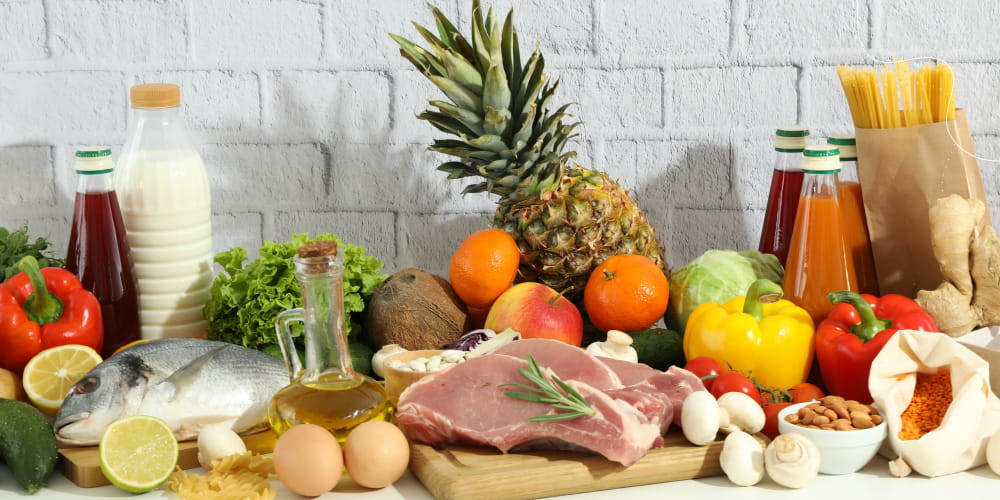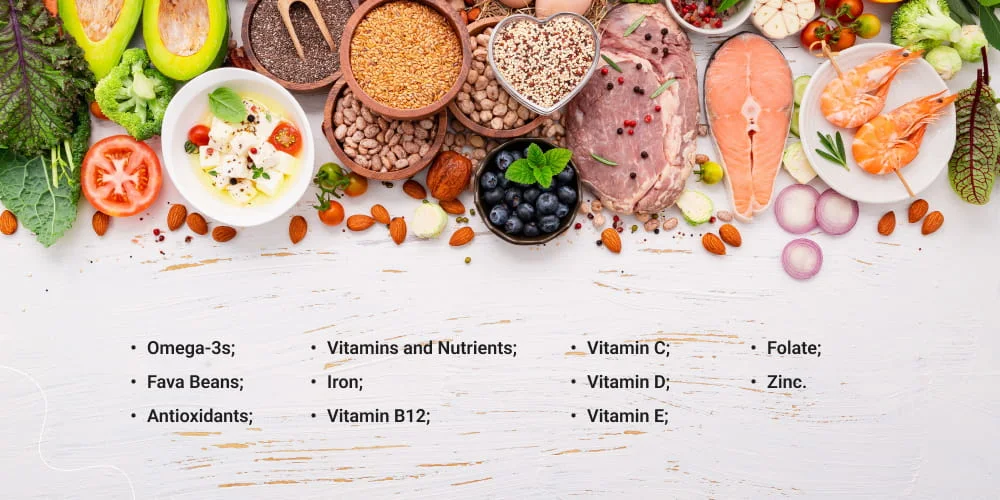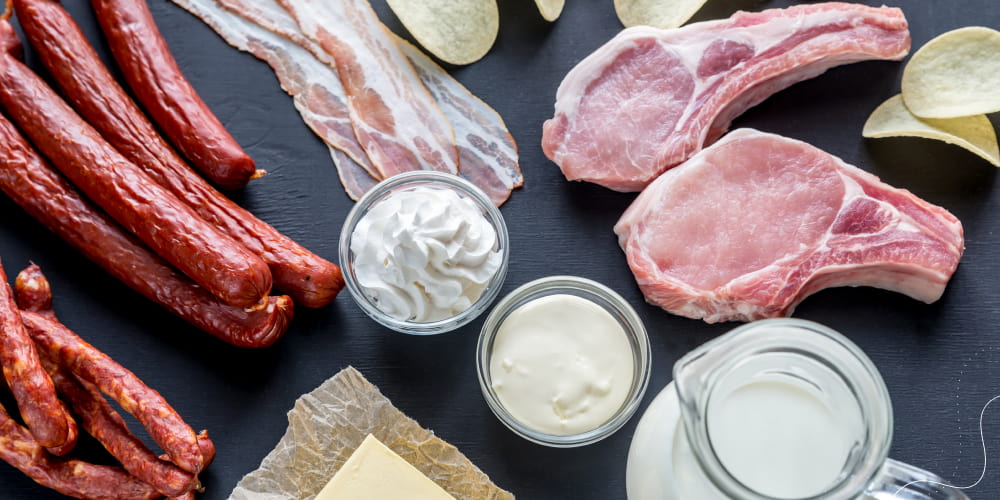The dietary formula for patients with Parkinson’s should contain unsaturated fats and unprocessed supplements rich in vitamins, minerals, and other vital elements.
These nutrients are required to:
- Enrich nervous, respiratory and cardiovascular systems to strengthen their natural functions for reducing Parkinson’s negative effects;
- Recover organs and tissues damaged by abnormal reactions from some medicines prescribed for the Parkinson’s patients,
- Boost energy to continue physical exercises to improve back and core muscles and restrict progressive nerve deterioration.
Therefore, any change in diet or adjustment should be coordinated with the neurologist’s recommendations if the person is suspected of having some symptoms of Parkinson’s disease and strictly observed if the patient has moderate to severe tremor syndrome.
The Lone Star Neurology team gathered helpful recommendations and samples to compile beneficial diet options allowed for Parkinson’s patients. Foods to eat and avoid with Parkinson’s disease combined with clinical treatment manipulations and tests will drastically decrease the ailment progression and prolong the patient’s normal life.
The Role of Diet In Parkinson’s Disease
The dietary varieties are a key component of recovery. Organic products rich in fibres, vitamins, and antioxidants complete a universal and flexible diet for people with neurological disorders, including Parkinson’s disease.
The medical society distinguishes diet therapy components approved for Parkinson’s treatment which include fresh vegetables, fruits, and berries without preservatives, sugar-contained foods, and fatty meal. The patients should follow several targets:
- Normalize digestive system functions. Patients with a deteriorated central nervous system complain of digestive system abnormalities.Constipation or stomach disorders are adverse reactions to medications or neurotic peaks. Therefore, in treating Parkinson’s disease, a well-balanced diet that regulates the intake of nutrients and the excretion of digested food or harmful substances can hardly be avoided.
- Improve motor abilities. The medical research emphasizes incredible changes among the focus groups who consume low-fat and ketogenic diets. Both categories show they improved motor functions with reduced shaking of hands, feet, or the head. However, people, who suffer from cardiovascular ailments, hyperbolic or hyperbolic blood pressure, should carefully adhere to keto diet rules and avoid these products due to harmful cardio effects.
- Regulate water balance. To provide a comfortable inner environment for blood circulation and kidney filtration function, patients with Parkinson’s should not neglect fresh water intake and water-contained fruits and veggies. Cucumbers, watermelons, melons, and some species of berries relieve the water balance and make the patient’s movements smooth and sophisticated.
- Recover damaged brain area. The critical task for anti-Parkinson’s diet is to increase brain-stimulated vitamins and elements in the organism. Products with high Omega 3s are essential nutrition included in the daily meal. The permanent consumption of nuts, fat marine fish, or unprocessed vegetable oils has mysterious capacities to recover the damaged nerve cells and ties and strengthen IQ metrics of Parkinson’s patients.
Foods To Eat With Parkinson’s
Luckily, balanced Parkinson’s nutrition includes a wide variety of fruits, berries, nuts, veggies, and ingredients of animal origin. The main principle for a weekly menu should refer to an equal proportion of required nutritional substances.
Omega 3s, fava beans, antioxidants, vitamins, and nutrients are well-known elements that build strong nerves and flexible muscle cells. Beneficial supplements could be taken in pills or through fresh or cooked products to enhance energy and life strength for Parkinson’s patients.
Omega-3s
The most obvious product rich in Omega-3s is cold-water fish fat. This micronutrient is an important source of elements that improve cognitive functions, strengthen the immune system, recover eye health, reduce heart attack risks, and treat mental disorders like depression and anxiety.
Parkinson’s patients could easily orient in a list of ingredients and prepare new dietary formulas. Along with fatty fish like sardines, salmon, tuna, mackerel, and seafood products contain, you may find Omega-3s in:
- Pistachios, cashew nuts, walnuts, hazelnuts, and cedar nuts that combine essential fats for brain activities,
- Plant oils: avocado, olive, coconut, flaxseeds, soybeans, and many other fat-contained vegetables with low cholesterol and high nutrition effects.
Fava Beans
These slightly sweet green legumes with an earthy flavor and optimal calories set are healthy to eat as raw beans and in ready-cooked dishes. Sophisticated agricultural products contain a group of vitamins, minerals, fibres, and proteins.
Therefore, frequent consumption of fava beans helps:
- Improve digestive system functions;
- Replace meat and other animal processed products full of antibiotics, GMO, or steroids used by farms for quick breeding purposes;
- Stabilize nervous and motor systems deteriorated by Parkinson’s progression.
Antioxidants
Parkinson’s treatment to take antioxidants or sedatives which counteract Parkinson’s disorders could be effectively improved via natural dietary components. Antioxidants refer to chemical elements that slow down the flow of molecules responsible for developing Parkinson’s disease. In fact, these substances are found in well-known and available products. A daily serving of a few grams of certain foods containing antioxidants can avoid and reduce the progression of Parkinson’s disease.
Acceptable products for the brain and nerves due to vitamins E, C and carotenoids consist of:
- Nuts;
- Dark chocolate;
- Tomatoes, eggplants, peppers, and other intense nightshade vegetables;
- Most forest, farm and garden berries: blackberries, blueberries, elderberries, and so on;
- Exotic Godji berries;
- Greenery like kale and spinach.
Vitamins and Nutrients
The most beneficial diet for reducing Parkinson’s or similar progressive neurological ailments always comprises foods with the high rate of vitamins and minerals in order to adjust metabolic processes inside cells and tissues. Vitamins C, D, E, B group, iron, zinc, and folate are supplements allowing for growing and developing organisms according to Parkinson’s treatment program.
Iron
Consuming iron-contained products provoke many discussions in the medical society.
Some scientists believe that increasing daily iron-rich diets negatively affects and enhances the harmful effects on patients with Parkinson’s disease.
Therefore, the following veggies and fruits should be controlled in order to compile the relief formula with anti-Parkinson’s agents:
- Tofu;
- Soybeans;
- Tomatoes;
- Potatoes;
- Leafy greens;
- Mushrooms;
- Prune juice.
Despite positive reactions of iron-filled foods to the heart, blood circulation, and oxygen-transmitted functions, patients and their relatives should consult neurologists before enhancing iron substances for the weekly menu.
Vitamin B12
Group B vitamins nourish the body with minerals that benefit nerve connections, skin, immune system and mental health. Scientists suggest that vitamin B12 deficiency in people with the first signs of Parkinson’s disease reduces the protective function to lower the risk of neurological ailments. The foods with high content of Vitamin B12 include:
- Fatty fish and seafood;
- Liver, chicken, and beef;
- Low-fat milk and fermented dairy products;
- Eggs;
- Wholegrain cereals.
Vitamin C
Parkinson’s disease declines motor abilities and immune barriers that the special diet could recover with increased vitamin C formula. Plenty of organic vegetables and fruits rich in ascorbic acid will decrease Parkinson’s progression and harmful deterioration of nerves connecting members and muscles. You may find Vitamin C in:
- Bell peppers;
- Citrus fruits;
- Greenery (thyme, pastry, spinach);
- Broccoli;
- Brussels sprouts;
- Sour or low sweet berries.
Vitamin D
The sun-generated minerals calm down mental disbalances and provide miraculous effects on the immune system. The medical practices identify Vitamin D as an essential source to strengthen anti-cancer barriers in the female organisms. For Parkinson’s patients, a diet diversified with Vitamin D foods reduces tremor progression and suspends the deterioration process. To receive the daily rate of Vitamin D, the patients with Parkinson’s disorders should expand their breakfast, lunch, dinner meal, or snacks with:
- Small fatty fish with minimal mercury content – cod, sardines, salmon, tuna, and fishery products – oil, cod liver, etc.;
- Fortified dairy products: yoghurt, milk, cottage;
- Orange juice.
Vitamin E
This fat-soluble vitamin traditionally qualifies as a female beauty secret. It improves brain activities and reduces Parkinson’s deterioration changes at incredible rates. Indeed, constant Vitamin E intake boosts the internal nutrition exchange process and relieves damaged areas.
To find Vitamin E among foods to avoid Parkinson’s disease, you may consume:
- Sunflower oil and seeds;
- Almonds;
- Peanuts and peanut butter;
- Yellow bell peppers;
- Fresh or baked pumpkin and pumpkin oil;
- Beet greens, spinach.
Folate
The woman’s preferable vitamin deals with blood cell formation and adjusts required nutrition to nerves. Therefore, young patients with Parkinson’s ailment need such vitamins to prevent the disease development in future generations.
If you have relatives with Parkinson’s disease or other neurological impairments, try to arrange their diet keeping in mind:
- Dark greeny leafy vegetables;
- Fresh fruits and juice;
- Berries;
- Whole grains;
- Fish;
- Plant oils.
Zinc
This microelement builds required protective barriers to your immune system and normalizes metabolism functions. The zinc shortage provokes serious neurological permanent changes of chronic or progressive nature. As a result, you have to face Parkinson’s or Alzherimer’s disease. The best source of zinc you may find in the following foods:
- Seafood: oysters, crabs, lobsters;
- Whole grains;
- Red meat and poultry;
- Nuts;
- Beans.
Foods To Avoid With Parkinson’s Disease
Unhealthy processed, specific dairy foods high in saturated fats and cholesterol are like a bomb that gradually destroys organs and impairs health. Suppose your eating habits include mostly sugar-enriched products and salty and fatty foods in your daily diet formula. In that case, you should be ready to have numerous health problems, including neurological ailments.
An unhealthy meal is a harmful trigger that:
- Deteriorates normal digestive functions;
- Increases blood clots and leads to blood circulation problems;
- Reduces oxygen and nutrients supplied to nerves and life-supporting areas;
- Deteriorates mental and emotional health states.
Processed Foods
Eating processed foods could provoke different diseases in the long-term perspective. Numerous processing stages of agricultural products ruin natural molecule ties and structures and lose beneficial elements vital for everyday living conditions.
Processed supplements must be eliminated if you want to build a healthy dietary program for Parkinson’s patients. Such foods include:
- Cheese;
- Sausages and meat products;
- Canned veggies and fish;
- Semi-processed products.
Certain Dairy Foods
Dairy products require particular attention if you plan to add them into your everyday diet for improving Parkinson’s patients’ health. Before buying them, you need to focus on:
- Organic, GMO- and sugar-free nutrition;
- Articles without high animal-originated fat;
- Fermented foods with numerous beneficial bacterias;
- Products manufactured from fresh eco ingredients.
Saturated Fat and Cholesterol Foods
Fast foods and meals with trans fat content is a poison for Parkinson’s patients. People with tremors, slowed motions and deteriorated cognitive functions could intensify the progressive harmful impact on focal areas. In addition, Parkinson’s patients could receive heart attack risks or cardiovascular ailments.
What To Do If A Person With Parkinson’s Has No Appetite?
To stimulate the appetite and gain weight of the Parkinson’s patients, caregivers can:
- Ask for a neurologist and dietician to adjust the diet formula;
- Receive prescriptions for vitamins and food supplements in form of capsules or syrup;
- Treat depression, anxiety, and other mental disorders;
- Improve emotional conditions and reduce external disbalancing triggers.
Follow Nutrition Clues By Lone Star Neurology To Resist Parkinson’s Syndrome
Many additional recommendations for dietary formulas for Parkinson’s patients have been adjusted to suit individual health conditions. Any decision to make dietary changes on your own can lead to fatal mistakes. The Lone Star Neurology team is ready to help you develop the best diet to reduce neurological disorders previously tested and examined thoroughly.
All about the Parkinson’s disease you can read in our article.
FAQs
- What foods should Parkinson’s patients avoid?
Fast food, meals high in trans fats, highly processed foods, and sweet and salty foods contribute to the development of Parkinson’s tremor and provoke related health problems that complicate the healing process and lead to deadly consequences.
- What foods should Parkinson’s patients eat?
All organic vegetables, fruits, dairy products and animal products rich in vitamins, proteins, fiber, minerals and antioxidants will provide a solid background for a treatment roadmap to reduce the perilous progression of Parkinson’s disease.
- Can Parkinson’s be reversed with diet?
Everything we eat will become a result of our health problems or energy stimulation. Modifications in dietary formulas could enhance physical efforts and clinical treatment to achieve incredible improvements with Parkinson’s progress restriction.
- What is a good breakfast for Parkinson’s patients?
Breakfast is a vital mealtime for patients with neurological disorders. People need to include maximum nutrients to get enough energy for rehabilitation exercises and daily activities. Fruit salad, a vegetarian omelet, whole-grain cereal porridge with berries, farm dairy products and herbal tea are preferable for everyday diet.
- Are bananas good for Parkinson’s patients?
Bananas contain many beneficial minerals and vitamins for the cardiovascular system. However, they should be taken on a balanced diet.
- Which fruit is good for Parkinson’s?
Fresh fruits and berries grown on farms or imported from countries are a source of vitamins and fiber that improve digestive, motor, nervous, cardiovascular and respiratory functions.













Please, leave your review
Write a comment: